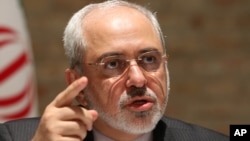A State Department official said an upcoming Europe-Iran business conference, the first gathering of its kind, underscores to Iran the great benefits of reaching an agreement with world powers on its nuclear program, as well as the cost of failing to do so.
The official, who spoke on condition of anonymity, told VOA's Persian Service that those benefits will come "if and only if" Iran can demonstrate to the international community that its nuclear program is peaceful.
The Europe-Iran forum will take place in London next Wednesday and Thursday, October 15-16.
The gathering will unite more than 200 business executives with policy makers from Iran and Europe to discuss what event organizer the European Voice newspaper describes as "the opportunities and challenges represented by Iran's valuable and largely untapped marketplace." European Voice said the goal is to evaluate Iran's "post-sanctions trade framework and investment opportunities."
But the State Department official who spoke to VOA said that without a comprehensive solution with Iran, the U.S. has been "very clear that the moment talks turn into proscribed business activity, we will respond with speed and force."
The official said a representative of the U.S. Embassy in London is expected to attend to observe the discussion and that anyone who violates the sanctions against Iran will face "severe penalties."
Speakers at the event are expected to include former British foreign secretary Jack Straw and France's former foreign minister Hubert Vedrine.
The November 24 deadline for Iran to reach a deal with the P5+1 powers is fast approaching. The deadline was set after the two sides failed to reach a July target date for an agreement.
Iran and the six world powers reached an interim deal last year to reduce sanctions in exchange for Iran curbing its uranium enrichment, but the push now is for a comprehensive agreement.
Iran insists its nuclear ambitions are peaceful, but Western nations have long accused it of pursuing nuclear weapons capabilities.
The P5+1 consists of the five permanent members of the U.N. Security Council -- the United States, Britain, France, China and Russia -- plus Germany.




